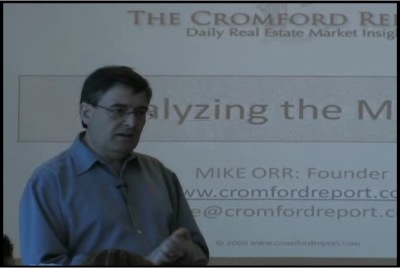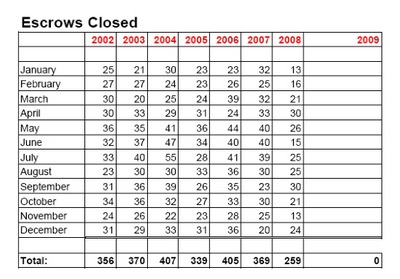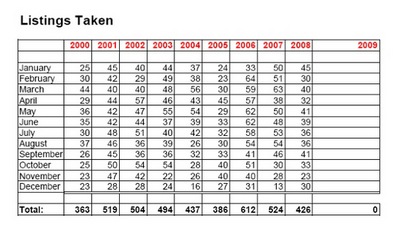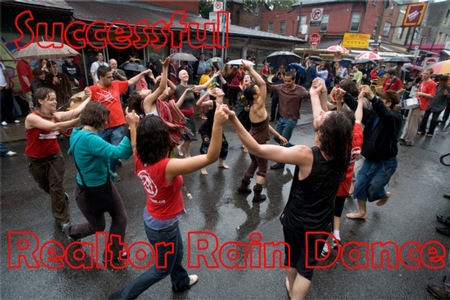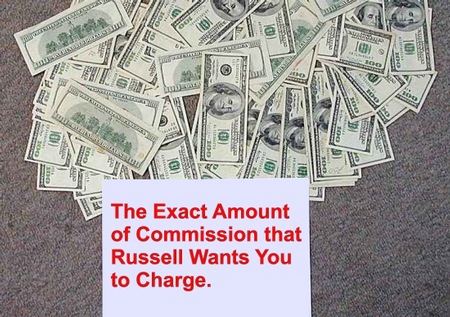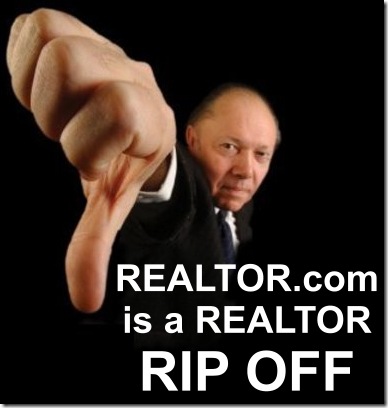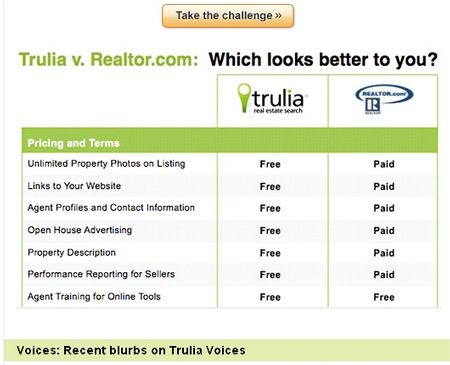Here is a professional quality video of Mike Orr of The Cromford Report giving a talk at a Mastermind meeting I attend every month. It is about an hour long and the specific stats won’t apply if you are not in the Phoenix area. His interesting and unique methods for tracking and predicting short-term price movement will apply. If there is something better available I’ve not seen it. Click here for the link to the video.
Mike Orr and The Cromford Report
May 22nd, 2009NAR – Welcome to the Waffle House
May 20th, 2009Just as a gentle reminder to all of what the actual purpose of the National Association of Realtors is supposed to be:
"The core purpose of the NATIONAL ASSOCIATION OF REALTORS® is to help its members become more profitable and successful." You can see that here.
Prior to reading this post – which most internet-savvy Realtors have now read – I didn’t know what "indexing" was and didn’t care. That was something I only learned in the comments section of that post. So I now ask, Is it possible that Paula was wrong to allow search engines to find all of those listings on her site and for Google to index them? Is it possible? Really, isn’t it possible? Well it must be possible, some people at NAR already thought it was wrong and Paula’s local association leaders also seemed to think it was wrong. Do I personally think that a "no indexing rule" would be such a horrible bad thing? If no one, no company could index listings?
It would be alright with me if Realtor.com wasn’t allowed to do it. But Realtor.com is allowed to do it. And they are also allowed to use terms like "MLS" in their meta words. All of the listings on Realtor.com can be found by Google and indexed. Because some people at NAR (who couldn’t see around corners, even a little bit) originally gave away the name, "Realtor.com" to a for-profit company instead of making it a member benefit we now have LOADS of other places that have our listings out there to be indexed. Trulia, Zillow (and a growing list of other sites with MLS feeds) are all allowed to have the listings available for indexing. These are all companies that would not even exist if it weren’t for NAR’s original mishandling of Realtor.com. Is NAR going to stop them? Could NAR stop them? Is NAR going to stop Realtor.com from allowing listings to be indexed?
This past week in Washington D.C. it looked for a brief moment like sanity would prevail. In the end it didn’t. Can anyone (elected or paid staff) at NAR, on any committee or in any position explain how this makes even a little bit of sense? Or are you going to try to ignore this issue by justifying it with, "It will be taken up by the committee in November"?
Why would it be okay with you for public – for profit companies – to have the right to freely do something that Realtors are then prevented from doing? What twisted, tortured logic is used to justify that?
Anyone?
To Clarify ….
March 15th, 2009A great question from Mike Price in response to this post:
Russell,
What percentage of brokers would you guess use any sort of formalized tracking system for analyzing lead sources? At an agent level?
When you finally created and implemented a business system, did you put into place your own tracking system or did you use something off the shelf?
Excellent questions, Mike. I’m glad you used the word, "guess", because that is what I will have to do to respond. At the broker level, I am thinking any brokerage firm with 20 or more agents – that is still in business and has the resources to stay in business – uses some sort of stat analysis. I don’t know about the tracking part. Keep in mind that a "lead" to a brokerage firm is seldom a buyer or seller – it is an agent. One they can hire. A lead for a brokerage firm is a possible hire. Most successful brokers are not in the real estate business – they are in the get and keep agents business.
At the agent level, it is an easier question to respond to – as all successful agents keep some kind of stats. Sometimes referred to as, "they know their numbers". They seldom know them all and there are some stats that most agents will go out of their way to "not-know" (like actual number of listing appointments). But top agents will typically have a pretty good idea of how many listings they take a month, how many closings they have a month, how many leads they get a month, how much income they get per year and per month. The better ones will have their lead sources specifically named, as well. How many deals did I get last year from referrals? From internet leads, from my geographic farm, etc.
Any agent not keeping those stats (which I am estimating at 93% of all Realtors) will not be able to do much business. My answer to your lead question is 7%. Nationally, and in most specific locations, 7% of the agents do over 80% of all of the business. It isn’t 80- 20. It is 93 – 7. 7% of the agents do almost all of the business and 93% of the agents do the remaining 20% of the business. There is a bright line of demarcation between the two groups. That line is keeping track of important stats.
The answer to your 2nd question is easy. I used the "count them once a month" method and then transferred the "IIII", then crossing through with a line = 5, into a spreadsheet. I’ve included three of those stat sheets here. As you can see I have not yet bothered to enter January or February’s stats to the Excel spreadsheets. Very sophisticated, I know. 🙂
And from Dru Bloomfield to this one:
Russell,
You should know that this post has generated side bar conversations. The face-to-face kind. One of the points that came up in a couple of these conversation was that any Gen X/Y Realtor needs to seriously consider online social network as part of their marketing mix. They are there anyway – it’s where they grew up. It’s where their future client base is and will be.
Some of us who are older may be less comfortable with this kind of relationship building, but in fact, that is what is happening. I watched Amy Cherow and Phil Sexton greet other like old friends yesterday. They had never met in person before, but they immediately jumped into a prior Twitter
conversation about skiing that went on and on.
I think that we can talk about marketing and SEO and producing, but ultimately what these on-line tools are doing is building relationships. In this fast-paced world, we are all looking for instant gratification or proof that our efforts are working.
That being said, social networking isn’t for everyone, just like TV or direct mail don’t fit for others.
My humble opinion is that agents must market in a way that’s enjoyable and productive individually, since these actions must be repeated over and over to achieve their personal goals.
I realize this brands me as someone suffering from something other than terminal hipness but I don’t really understand someone getting a tattoo. I understand the desire to "be unique". I understand how the process of getting the ink under the skin is considered art by some. I have many friends who have "gotten inked". But the bottom line is, I really don’t get it. Why, in the name of God would someone want to f–k up their body permanently for something that is guaranteed to look just awful later?
I feel exactly the same way about "social networking". I don’t get it. What the hell does it have to do with business? Or me?
Big businesses are usually based on marketing (getting the customer to reach toward you first) as opposed to prospecting (you reaching to the customer first). Speed of getting a potential customer’s questions and concerns responded to accurately and quickly is of paramount importance. But I don’t even take my cell phone with me when I am out of my car (unless I want to play solitaire while I eat). I get about 150 emails a day. As it is now, I already have all the off-beat requests, odd issues, and "important news" coming my way that I can handle. Already, I "delegate graciousness". I am not trying to network. That said, there is nothing that Drew wrote I disagree with – nothing. Like getting a tattoo, it isn’t for me. Doesn’t mean it can’t be art. Or fun.
I Mean Business
March 12th, 2009What is a "top producer"? How is it defined? Why would anyone care?
Some would say if you are in the top 10% you qualify. I set the bar higher because the bottom 90% is doing so poorly. To be in the top 1% – of all agents in the United States – you would need to sell about 40- 50 houses a year. The first year I qualified I sold 38 houses. At 40 – 50 sales in a year you would probably always be in the top 1% in your area and in the country.
Why does it matter? Why have you seen me mention so many times, "what top agents do"? It certainly isn’t to suggest that someone doing less or something different is in any way "wrong". There are many many ways to approach this business and anything that is working can be defined as "good". To me it has to do with systems (successful methods). There are some top agents that have very poor systems and handle their business by taking each particular situation, each escrow and just "glowing it right". Through sheer intention and desire, making it close. Forcing the deal together. These agents do not have a stable business but have a temporary perch they will soon fall from. When I think of "top agents", for me, it is really shorthand for "has workable systems". Most importantly, top agents who are stable top agents spend very little energy "glowing things right" with regard to procuring new business. Without exception, they have exact and specific methods they apply again and again and again – and get the same predictable results each time. They have a system for getting business. They do not depend on: lucky breaks, caught a good one, happened to meet a guy who is ready to buy, didn’t expect it to happen but it did sell and close. As I personally spent the first twelve years of my real estate career depending exclusively on lucky breaks, happening to catch a good one, etc. – I am very familiar with how that works, as well.
During my first twelve years in real estate all of my deals – each and every one – came about as sort of a fluke. If I had arrived just 15 minutes later, I might have missed it. If I hadn’t driven down that street I wouldn’t have seen the guy in his front yard by a FSBO sign and wouldn’t have stopped to talk to him. I discovered that I could get business from almost any activity. Just about anything could produce a deal or two. But while striking up a conversation with the guy behind me – while playing goofy golf, or chatting with someone in line at the drugstore or a movie theater could produce business, it wasn’t a very predictable method. It is this point alone – a predictable method of producing new customers – that separates the top agents from the pack. This is what makes the difference between having a business and having a job. It was in 1990 I started to really make that transition from hoping for a deal to the continuous creation of deals (developing workable systems).
So when I hear someone say, "I got a deal from twittering", "I met the client at a Kiwanis meeting", "I knew them from church", "We golf together", "The neighbor really liked my custom yard sign", etc., to me that sale is in the category of a fluke. I mean no disrespect. That is not to say it didn’t happen or will never happen again but that it is not a controllable event. I can’t go to enough Kiwanis meetings to get all of the business I want. I can’t happen by enough golfers to support myself. During those lean years I did have "miracle escrows" that truly seemed like a gift from heaven at the time. And I was grateful too. But I was also determined to eventually get to the miracles as usual level. That required workable systems.
1. The Discount Realtor Rain Dance
February 24th, 2009
I believe that the success of a rain dance has more to do with timing than the quality of the dancing. A few short years ago the discount real estate companies were being heralded as the wave of the future. "Traditional brokerage" was all but finished. Game over. Now the internet based, lower fee, more modern, forward-thinking companies would dominate the industry.
Virtually all of the real estate companies that proclaimed this the loudest are either already completely out of business or have dwindled down to the point that few think of them as much of a threat to anything (except their own stockholders). Oh sure, a few companies are still attempting more "innovative things" but eventually the venture capital folks will pull the plug on the money hemmoraging and that will be the end of this particular round of remarkable real estate sales innovation.
What happened?
Discount companies in real estate brokerage tend to fall into one of two categories: national or regional companies funded by investors (who believe there is a scalable model) or a small, local, one-man show. Can the one-man show survive? Sure. Pretty much anytime anybody puts enough of themselves into anything they can make it "work". But those people don’t have a business – they have a job. Usually, they can’t even afford much in the way of help, let alone have a business model that is scalable. It seems that the proponents of "let’s charge less" to drive in lots of business often overlook the obvious fact that less means less for them and less to pay for promotion. If you take in less you have to (without increasing your overhead by very much) take in that "less" far more often and in far more volume in order to have "enough".
So how come these companies that were charging less and thereby so successful a few short years ago are now going out of business? Yes, it is true that all companies are having a rough go of it just now but the discount companies have been hit even harder than the traditional brokers. Glenn Cohen, the guy who started the company that later became Foxtons, here in the U.S. had this to say, about a month ago, at Inman Real Estate Connect:
"…because in a down market people are desperate to sell, and in their mind believe — whether it’s true or not, and in some cases it very well is — that the local agent of the big brand name can do a better job for them and they’re less likely to trust the sale of their home with a discounter.
I don’t say it can’t work, and there always will be a small place, I think, for flat-fee MLS and for discount. And if you develop some best practices around it you can do really well, but frankly you can’t make a whole lot of money as a flat-fee discounter, at least the way I view the business model. So it’s not all that enticing for an entrepreneur."
Why would the consumer’s perception of what is a good real estate company or a good real estate agent change? What causes that change? Why can’t a discount company continue to attract the consumer when the market is "bad"? After all, they charge so much less, don’t sellers still want to save all that money? The correct answer? Yes, if they believe they can. In a long-lasting seller’s market they believe they can. When the market turns and favors buyers then sellers stop believing that "just anybody can do it".
This last seller’s market was the longest one in history. We’ve never had a seller’s market that lasted that long before. Historically, about two-thirds of the time it is a buyer’s market and about one-third of the time it is a seller’s market. The "natural" seller’s market was winding down just about the time the dot.com bust happened in the stock market. Then all of that stock market money started chasing real estate and what should have been a buyer’s market turned into a red-hot seller’s market. This was further fueled by Wall Street criminals (like the kind at Bear Stearns) who created and caused the sub-prime mess (and cheated French, Chinese and German bankers out of hundreds of billions of dollars). A direct result of this was that more discount real estate companies came into existence and survived than at any time in history.
To someone who just recently arrived it did look like the game had changed and the "traditional broker" was going the way of the buffalo. If only that seller’s market would last forever. But it didn’t. They never do. Which is the "problem" that discount real estate companies have. They thrive in a seller’s market and can’t survive well (or at all) in a buyer’s market. When it is easy to sell any house the value of a Realtor’s knowledge – in the eyes of the public – goes down. Way down. It doesn’t take much to "become a Realtor". When anyone can "become one" and anyone can sell a house there is extreme downward pressure on commissions and most agents are seen as a "commodity" by the public. Which agent can we hire for the least amount of money (as they are all the same, producing the same result) becomes a common viewpoint from which agents are viewed by sellers.
When the market shifts and there are more sellers than buyers (and this will always eventually occur) it is no longer true that "anyone can do it". Few of the agents who came for the gold rush stay and even many of the old-timers head for greener pastures (as in another line of work) all agents are no longer seen as a commodity. In fact, some are now perceived again as a fiduciary. It is almost impossible for a company that based their entire marketing campaign on "we do it for less" to later be perceived this way. To the exact degree that they were successful with their "we do it for less" message – they will continue to be be stuck with that tag and perceived as "we do it for less" when what the seller now believes is "I need more". Oddly, most individual agents (if they have their eyes open) can turn on a dime and change with the times, it is companies that are stuck. It is companies that ran national PR and advertising campaigns. When it comes to marketing, most agents seldom rise much above mailing postcards to a geographic farm.
The Wall Street types, the investment bankers, the marketing geniuses, the brilliant entrepreneurs who (every time there is a prolonged seller’s market) come out of the woodwork and start their "takeover of the real estate industry" uniformly achieve all of their success only during a seller’s market. Their dance worked. They were brilliant. Then.
This will all happen again. It might look just a little different next time but it will still be the same thing. If you’re young enough you will get to see it again a couple of times.
Remember this post or bookmark it.
2. Invitation to the Realtor Ghost Dance
February 24th, 2009It would seem that anything, any idea, if combined with aesthetics can be made to stick. Someone will embrace it and buy into it. Apparently, there is no idea too preposterous, or so idiotic that it can not find a home. From young men wearing big baggy pants, put on backwards, to Indians wearing "special shirts" that will stop bullets, there is always someone who is all in.
There is an endless supply of wonderful ideas from well-intentioned and those who only pretend they are well-intentioned about what "ought to be done with the MLS". Most of these ideas would radically change or pervert the purpose of the MLS (an offer of compensation) to the point where it would not be recognizable.
One of the more destructive ideas is "divorcing buyer agent commissions".
Most of the arguments seem to be based on it is "still sub-agency", and it isn’t right because the buyer’s agent is being paid by the seller (via the listing agent). It is like we are lawyers. We are not. We are salespeople. Our job is to sell homes or find one for the buyer. Also advanced is the entirely false premise that the buyer pays the commission via the seller and the listing agent. If that were true then you could see the commission shown as a cost on a FNMA appraisal. But it isn’t there because it does not belong there. A FSBO can get their identical home appraised for the exact same price as a home listed by a broker. The reason that sellers believe they pay the commissions is because they do pay the commissions.
Setting aside that fact that "divorced commissions" is a completely destructive (towards Realtors and the public) idea, what is interesting is that virtually all of the wonderful new things that could be done if only the commissions were divorced can be done right now with no change being made by anyone else. That’s correct. Want more commission than is being offered? It can be done. Want less? It can be done. All, right now. What the people working on this are really trying to do (as they have a "better" idea) is to regulate how YOU do business. Not how they do business.
MLS is working just fine, thank you.
Could a buyer agree to pay an agent "X" per hour to show them homes and write an offer? Sure. I believe there are lots of agents who would welcome a set fee per hour, regardless of if the person ever bought a home or not. Various people (who can’t think clearly) like to insist what a wonderful world it would be if we could all do something like that – it would be so honest. Many lawyers get paid like that, in fact, some of them insist on being paid like that. Why wouldn’t that work for Realtors? Simple: because most buyers of most houses would not be interested in making an agreement like that. Ever. They strongly prefer the lawyer "contingency" method – you, Mr. or Ms. Realtor, collect your money at the end. No sale, no pay.
Few buyers are going to pay by the hour for agents to show them houses, regardless of if they buy or not and in most cases they are not going to agree, at all, to pay an agent’s full commission if they can buy a home direct from the seller or through the listing agent and not have to pay any commission. Most buyers (unless they are in litigation) do not find "agency" worth paying for or even talking about all that much. Buyers want – and are looking for – a house, not an agent. If you wanted to buy a new car, can you even imagine thinking, "I sure hope I can find a really great car salesman to help me and explain all that confusing paperwork"? Or is it far more likely you would be willing to tolerate talking to the salesman in order to get the information you wanted? "Enforcing agency" on the public will amount to NO agency. They won’t pay for it. Buyer agents who are "for divorcing the commissions", would, if "successful", only succeed in putting themselves out of business.
It can be remarkable the things people will sometimes do on the subject of failure. To work on something like this a working Realtor would have to have at least a low-grade death wish for themselves and others. Those outside the industry working on it have one for us. Not necessarily low-grade.
3. There is Real Joy in Doing "Meaningful Work"
February 24th, 2009Years ago my sister went through nursing school and completed all of the requirements to become a Registered Nurse and graduated. Nurses were in demand so she got a job as an R.N. quickly. She kept that job for exactly two weeks and quit. She didn’t like anything about being a nurse. Shortly after quitting the hospital, she took a job working as a bookkeeper for an accountant, where she stayed for years. She must have liked the idea of being a nurse but not actually being a nurse.
Many men and women complete law school and yet don’t practice law. Because the barrier to entry is so much lower a huge (as in very large) number of people enter the real estate business and don’t stay (about 13 out of 14 are gone by the end of the 2nd year). "I think I would like driving around town in a Cadillac, wearing nice clothes" is one I used to hear a lot when I drove a Cadillac.
People who aren’t actually in a particular game seldom ever know what it is really like to play that game. They think they do but they don’t. Even the players themselves have to get "all the way in" a game to really get it.
In his groundbreaking book, "Outliers", Malcolm Gladwell identified the three qualities work has to have if it is to be satisfying: autonomy, complexity and a connection between effort and reward. Being a Realtor – for those fortunate enough to get into the business far enough to make a full connection with those three things – this business can be mostly joy. Outsiders can’t usually see that part. It is invisible to most of them and even to many in the business. Nevertheless, it is there for all who care to partake.
For the following three paragraphs I am borrowing (direct text or concepts) from Malcolm’s wonderful book:
When you come home at night you might be tired and even short on cash and a bit overwhelmed. But you are alive You are your own boss. You are responsible for your own decisions and direction. Your work is complex: it engages your mind and imagination. And in your work there is a relationship between effort and reward: the longer or more effectively you work on and in your business the more money you can make.
Those three things – autonomy, complexity and a connection between effort and reward – are, most people agree, the three qualities that work has to have if it is to be satisfying. It is not how much money we make that ultimately makes us happy, it’s whether our work fulfills us. If I offered you a choice between being an architect for $75,000 a year and working in a tollbooth every day for the rest of your life for $100,000 a year, which would you take? I’m guessing the former, because there is complexity, autonomy and a connection between effort and reward in doing creative work, and that’s worth more to most of us than money.
Work that fulfills those three criteria is meaningful. Being a teacher is meaningful. Being a physician is meaningful. So is being an entrepreneur. ….. Hard word is a prison sentence only if it does not have meaning. Once is does, it becomes the kind of thing that makes you dance for joy.
Any Realtor who learns to effectively lead generate (lead generation itself has all three: autonomy, complexity and a connection between effort and reward) can have a business worth having and a life worth living (as in mostly fun). Lead generation is very well covered in Gary Keller’s wonderful book, "Shift". I highly recommend it.
Odd Times for John
February 19th, 2009
Truth is, I’ve been working on a three-part series that is not complete. But the following questions from John just went to the front of the line.
These are odd times I’m in right now, and I’m not quite sure how to deal with it.
As of the past week, it looks like I’m now on a 10 appointment per week schedule. I am absolutely slammed. I’m behind on pricing 6 properties that I’m supposed to be done with already. I am left with no "on the business" time so all of my projects have been on halt for a couple weeks now, which is unsustainable if I want to keep growing and improving the company.
10 appointments per week was the point that I was hoping to bring on a listing specialist.
But the problem is, we are WAY down on sales. Right now, I’m having cash flow issues, but I expect/hope those to clear up soon. But looking at the big picture, if you’re looking over the last 4 months, our total market volume (and thus the total available income) is down 35% compared to the same period last year. My GCI is nearly identical (within just a couple hundred dollars) between those two time periods. Net profit is 5K better (3K profit compared to 2K loss).
As far as supply and demand, our market is around 12 months of inventory right now when looking over the last 4 months, compared to around 8 months of inventory for the majority of last year (until October).
Right now, I only have 2 open escrows out of 22 total listings, and zero buyer escrows. I’ve been firing sellers left and right and slashing prices, but I still haven’t been able to get back to the 30% of listings in escrow number.
By the way, I picked up a pretty big new lead source… I’m now the "listing partner" for a home builder with nine communities here. Whenever someone wants to build a house on a contingency, the only way that person can do it with refundable earnest money is to list with me. Otherwise, they have to put up 5-7K non-refundable. We went official with this last Wednesday, and I’ve already booked 5 appointments from them. The best part is, I get to charge the full 6% and don’t pay them any referral fees.
Also, the TV ads have been working nearly as well as the radio ads this month.
Any wisdom or suggestions for me?
Thanks!
John
The very first thing is to congratulate you on your excellent performance! I wish I had been this far along when I was only three years in the business. Giant plus points are TV & radio ads working well; enough market ethics presence to land a nice builder account; and nicely increased GCI, especially when compared to the market.
Negatives: you are colliding with several different problems, all at the same time. At 8 – 10 appointments per week you normally would bring on a listing specialist. To clarify, I have never "brought on a lister", nor would I ever do that. I always take my most trustworthy buyer specialist and promote them. This person must be a team player – not "a salesman". I would never "hire a lister", as it would be a sure-fire way to ruin what you have built. But that 10 listing appointments a week would have to be a sustainable level, not "I did it for a couple of weeks". You can stand on your head for a couple of weeks.
The problems:
1. Most listings currently being taken are not selling
2. Zero buyer deals in escrow
3. Overall market has changed enough that "comps" are now meaningless
4. Not enough time left over to work on organizing for the future
The solution(s): First and most importantly, recognize you need to arrive at the level of knowing you don’t know when it comes to prices. Most of your current listings are overpriced. Continuing to do what you are doing and thereby getting even more listings isn’t going to solve anything. In fact, it will only make the problem worse. I went through this too as our inventory ballooned. Handling this issue directly solves problems 1 and 3 and opens the door to handling number 2, as well. It won’t directly fix number 4 but fixing number 4 isn’t your most urgent problem. Getting price reductions (as in 2, 3, 4 or 5 on the same listing – until it actually sells) and only taking listings where it has at least a real chance of selling and has a seller who is fully onboard.
The magic formula: If it is in MLS correctly, on lockbox and not sold it is overpriced. Again: If it is in MLS correctly, on lockbox and not sold it is overpriced. There are NO exceptions to this statement. As in none. Your statement, "I’ve been firing sellers left and right and slashing prices, but I still haven’t been able to get back to the 30% of listings in escrow number" is an excellent start in the right direction. But it is only the start. Otherwise, your profitability is about to nosedive. No buyer deals and 2 listings in escrow screams out, "I’VE GOT A QUALITY CONTROL ISSUE". Price. Just that one thing will "fix" this. No other action will. If you are too short on time – to cope – start screening the sellers much more carefully on the phone so you only physically go to see the truly ready, willing and able.
Get your open escrow board filling up then – once you have "motion" back in your listing inventory then put your main attention on getting more listings. Naturally, I fully expect (based on your past performance) that you will revert this scene so rapidly it will even surprise you.
Let’s Talk About How Much We Charge
February 4th, 2009Let’s talk about commissions. Realtor to Realtor. We do it everyday with potential customers. Reporters can ask us how much we charge and then print our answers for other agents to read. You can call any real estate office and simply ask them or just look on their website (if they are willing to put their fees there as most discount companies are – and I am, as well). Would it be okay if you read how much another agent or company charges but not okay if you heard them physically say it?
A few years ago when I was speaking at Sell-A-Bration, in front of a few hundred people – which I will be again in a few days – I mentioned commissions and several people started openly protesting that I could not keep talking about it or they would have to leave the room. I patiently explained that I was not breaking any law, violating the spirit of any law or doing anything wrong. In fact, I was doing something very right: I was helping fellow agents to see that they didn’t need to "match commissions" with the limited service companies (the we-do-nothing-for-less-crowd), that there were services they provided and skills that every single person in the room possessed that factually mattered; that the running dog press had "their story" prior to "researching the article" and that ingesting a steady diet of poison would make anybody sick.
A few morons continued to loudly bray that if I did not stop talking about commissions they would leave the room. Fortunately for me the main entrance to that room was to my immediate left and was a very large opening. So it was quite easy for me to gesture towards that doorway so someone that unobservant wouldn’t have any difficulty finding their way out. Two or three people got up and left. Several of the CRS instructors in the audience had also tried to explain that there was nothing I was saying (including how much my fees were) that violated any law.
What is against the law (as it should be) is PRICE FIXING. Agreeing to all "charge a certain price".
Is it possible that someone honestly believes that I could make an announcement via a blog post (or speaking to an audience of a few hundred people) and "fix commission amounts"? "I charge ‘X’ amount because Russell Shaw told me to"; "Once the order from Russell arrived, we couldn’t charge any less"; "All of us now charge this amount, it’s the way Russell wants it now". Really? If I was truly that powerful I wouldn’t waste my power on something that stupid. And if I was going "fix commissions", I would have everyone in the country charging a lot more than me so I could get all of the business without having to try very hard.
Truth is, I am not in competition with any agents outside of my area (yes, yes, I know we really need a national MLS so all companies and agents will be free to prove they have no real knowledge or value) and I go way out of my way to help and train the agents who are here. Customers aren’t scarce. Regardless of what is currently happening (this day, this month, this year) I will continue to survive. I am not afraid of any competitor, in fact, I can now see that it is because of them I have arrived at my level of competence. Their ability to win what I wanted forced me to get better.
It does not matter to me what you charge. Charge the amount that seems right to you (based on your area, your price range, your competition, market conditions and your ability to effectively communicate your level of value. If you feel you must charge less because of the internet, the existence of discount companies, articles in the media, "ethical explanations" from other agents who are hell-bent on having less (for themselves and everyone else), or any other important reason to work on reduced prosperity for yourself and your fellows – I understand that nothing I am going to say or write is going to change your mind. This is strictly for those who haven’t already gone too far down the rabbit hole.
Thumbs Up or Thumbs Down on REALTOR.com?
February 4th, 2009This is another Open Letter to all of the officers, executives and staff of the National Association of Realtors.
Is Trulia better than Realtor.com? I received an email today from Trulia. Here is part of what was included:
Isn’t it amazing this can even happen? If Realtor.com had been set up correctly in the first place Trulia would not exist. Same with Zillow. Neither one of them would exist at all.
If NAR had set up Realtor.com correctly I wouldn’t have received an email like this one. Now or ever. Trulia is set up to make money for the stockholders of Trulia. Same with Zillow. It isn’t have they made any money yet, it is that is their purpose. They are the "agent’s friend" so that they can make money. Their "purpose" is not to "help agents", it is to make money.
Isn’t it remarkable that they can even make a comparison like the one above? Isn’t it fantastic that there is NO reason (as in none), for any Realtor to feel even the slightest loyalty to Realtor.com in a comparison like the one above?
Realtor.com is supposed to be in complete alignment with the purpose of helping Realtors. That is the "purpose" of the National Association of Realtors. That is the very reason and only reason the NAR exists at all. If they are not directly or indirectly helping Realtors then they are doing something off-purpose, that is not their job and most likely does not need to be done, at least not by them.
Some years ago, NAR pretty much gave Homestore (now known as MOVE, a for profit company) the right to charge Realtors whatever the traffic would bear. Just so long as each Realtor got each of their listings on Realtor.com "for free". It was an unworkable idea from the start and it hasn’t gotten any better. Realtors now get their listings on loads of sites "for free". Eventually, the leaders of the NAR are going to have to face the very unpleasant idea that the entire Realtor.com fiasco hasn’t really "worked" and it isn’t going to work. I understand that the people in power now are not the ones who created this mess in the first place. But there isn’t even any good reason now for recriminations towards them. Now and the future is what matters. Pretending all is well because the people involved are all very nice and you are friends with them isn’t going to solve the problem.
The more time that passes the more traction we lose. Take it back. Now. Sure it is going to be a huge undertaking. Most worthwhile things are.
It is not to late to make this right. Keep losing ground and it eventually will be. Take it back. Do the right thing. You only arrived at your position because you truly wanted to make a positive difference. Take Realtor.com back. It should be a member benefit. Period.

